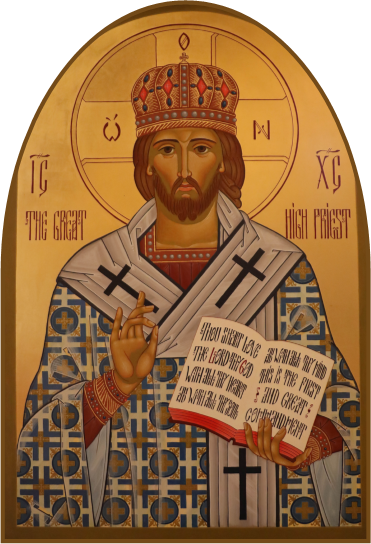The High Priest

"... and as Lord of all didst take the name of our High Priest1..." For us Orthodox Christians there is only one HIGH PRIEST, Jesus Christ himself. At our baptism we were marked with oil as a sign that we are consecrated to God and anointed by the Holy Spirit. We are joined to Christ and share in his threefold mission as prophet, priest, and king. The word “priest” means one who mediates in religious services and one who is holy or set apart to perform those services. In Judaism, there were various levels and orders of priests, but there was only one high priest. On the Day of Atonement, he would go into the Holy of Holies and offer sacrifice in the way God prescribed (Leviticus 16). The high priest had to repeat the sacrifice year after year. And when one high priest died, he was replaced by another who continued the yearly sacrifice on the Day of Atonement. Now that Christ has come, the sacrificial system of the Old Testament has been abolished. Christ has become our GREAT HIGH PRIEST who has passed through the heavens into the sanctuary of God. Christ’s sacrifice never needs to be repeated because through his death on the cross, and His decent into Hades and His destruction of death He has made a way for us from this world into the Kingdom of Heaven. In St. Paul's Letter to the Hebrews Jesus is called a "HIGH PRIEST" repeatedly (Heb 3:1; 4:14; 5:6; 6:20; 9:11). The one HIGH PRIEST who goes between us and God, and makes us right with God, and prays for us to God is not an ordinary, weak, sinful, dying, priest like in the Old Testament days. He is the Son of God—strong, sinless, with an indestructible life. Our HIGH PRIEST is seated at the right hand of the Father in heaven. 1Divine Liturgy of St. John Chrysostom - The Prayer of the Cherubimic Hymn
Le Grand Prêtre
« (...) tu t’es fait notre Grand Prêtre1 (...), ô Maître de toutes choses. » Pour nous, chrétiens orthodoxes, le GRAND PRÊTRE est « Jésus, le Fils de Dieu. » (Héb. 4, 14). Au moment de notre baptême, nous avons reçu une onction d’huile, signe que nous sommes consacrés à Dieu et oints du Saint-Esprit. Nous sommes unis à Christ et partageons sa triple mission de prophète, de prêtre et de roi. Dans le judaïsme, le grand prêtre est toujours pris parmi les hommes, et chargé d’intervenir en faveur des hommes dans leurs relations avec Dieu. Le jour des expiations, il se rendait dans le Saint des Saints et offrait des sacrifices pour ses propres péchés et pour ceux du peuple, selon les préceptes de Dieu (Lévitique 16). Le grand prêtre devait répéter le sacrifice annuellement. À sa mort, il était remplacé par un autre qui poursuivait le sacrifice annuel. Maintenant que Christ est venu, le système sacrificiel de l’Ancien Testament a été aboli. Le Christ est devenu notre GRAND SACRIFICATEUR qui a traversé les cieux pour habiter le sanctuaire de Dieu. Le sacrifice de Christ n’a jamais besoin d’être répété, car, par Sa mort sur la croix, Sa descente aux Enfers et Sa destruction de la mort, Il nous a ouvert la porte du Royaume des Cieux. Le GRAND PRÊTRE dont parle l’Épître de Saint Paul aux Hébreux (Héb 3, 1; 4, 14; 5, 6; 6,20; 9, 11) intervient et nous rend justice auprès de Dieu. Il n’est pas un prêtre ordinaire, faible, pécheur, mourant, comme au temps de l’Ancien Testament. Il est le Fils de Dieu — fort, sans péché et indestructible. Notre GRAND PRÊTRE par excellence, le Seigneur Jésus, est le Christ rédempteur, le Médiateur universel, assis à la droite de Dieu. 1 Divine Liturgie de Saint-Jean-Chrysostome — Prière avant la Grande Entrée